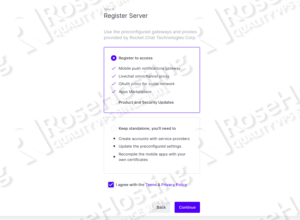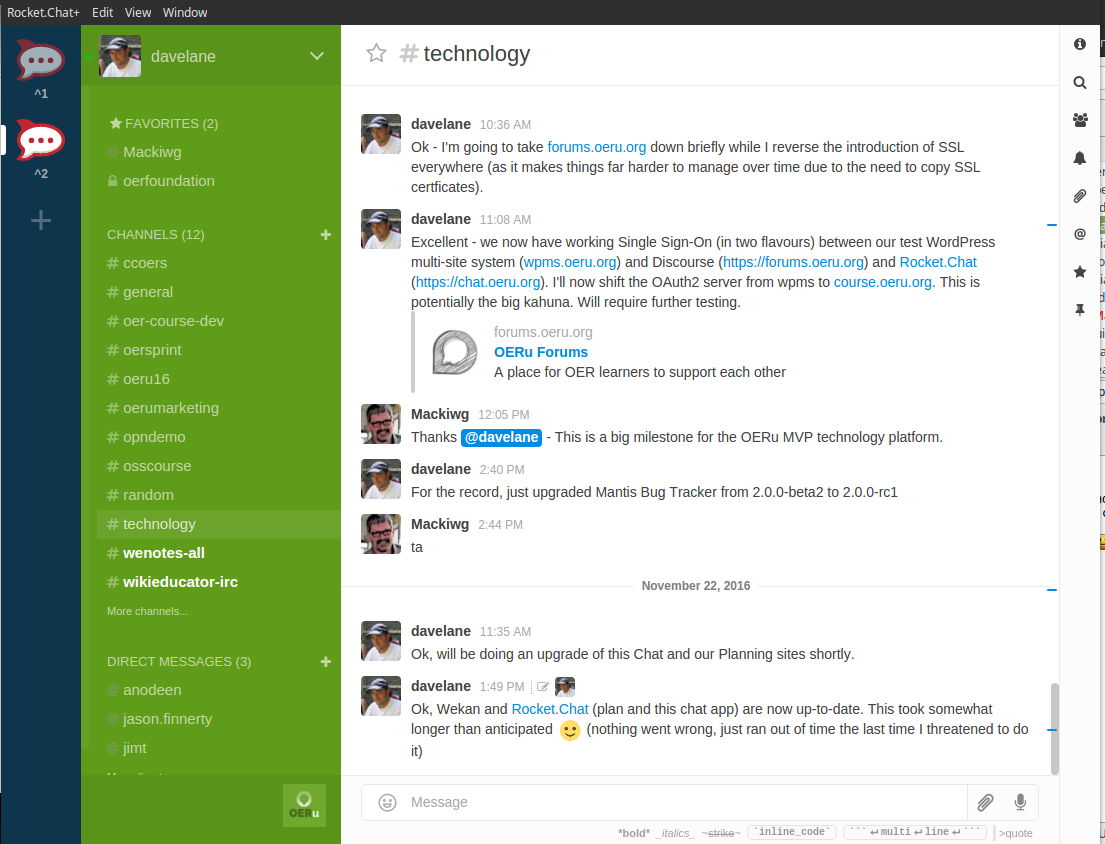
The final steps are to finish the installation using the Rocket.Chat setup wizard.
#Rocketchat server update#
Don’t forget to update the ROOT_URL with your own domain.Īnd now enable Rocket.Chat at boot and start the service: systemctl enable rocketchat systemctl start rocketchat Step 5: Finish the installation The file may be different depending on what folder you used for Rocket.Chat. Next, create a systemd file for Rocket.Chat: nano /lib/systemd/system/rviceĭescription=The Rocket.Chat server by Īfter=network.target remote-fs.target nss-lookup.target rvice rviceĮxecStart=/usr/local/bin/node /opt/Rocket.Chat/main.jsĮnvironment=MONGO_URL=mongodb://localhost:27017/rocketchat?replicaSet=rs01 MONGO_OPLOG_URL=mongodb://localhost:27017/local?replicaSet=rs01 ROOT_URL= PORT=3000 Then, move the content to a new directory for Rocket.Chat (you can use a different one): mv /tmp/bundle /opt/Rocket.ChatĬreate a new user for Rocket.Chat: useradd -M rocketchat & usermod -L rocketchatĪnd update the permissions: chown -R rocketchat:rocketchat /opt/Rocket.Chat
#Rocketchat server install#
To install Rocket.Chat, navigate to this directory: cd /tmp/bundle/programs/serverĪnd run the following command: npm install The next step is to download the latest Rocket.Chat: curl -L -o /tmp/Īnd extract it with the following command: tar -xzf /tmp/ -C /tmp N 12.18.4 Step 4: Download, install and configure Rocket.Chat Next, you should install inherits, n, and the node version required by Rocket.Chat (as of writing it’s 12.8.4, so check the official docs later.) Run the following commands to install them: npm install -g inherits n

To install node 12.x, run the following commands: curl -fsSL | bash - yum install nodejs -y The Nodejs version in CentOS 8’s repositories is 10.x, but Rocket.Chat should be run with a newer node version. Sed -i "s/^#replication:/replication:\n replSetName: rs01/" /etc/nfĬheck if everything is ok: mongo -eval "printjson(rs.initiate())" Step 3: Install Nodejs Next, set up a storage engine and replication for MongoDB with the following commands: sed -i "s/^# engine:/ engine: mmapv1/" /etc/nf Then enable MongoDB at boot and start the service: systemctl start mongod Next, to install MongoDB, run: yum install mongodb-org -y It may be a different version by the time you’re reading this, so update the file accordingly. To install MongoDB, first create a repo file: nano /etc//mongodb-org.repoĪnd add the following in the file: īaseurl=$releasever/mongodb-org/4.4/x86_64/Īs of writing, the latest recommended MongoDB version is 4.4. Rocket.Chat uses MongoDB as its database server. Then, install a few necessary packages (if they’re not installed already): yum install epel-release curl nano tar gcc-c++ make GraphicsMagick -y Step 2: Install MongoDB The first step should always be updating the server: yum update -y Step 1: Update the server and necessary packages

The $5 VPS from Vultr meets those requirements. This server should be ok for up to 50 active users and 200 users in total.

The minimum server requirements according to the official Rocket.Chat docks are: This tutorial should work for CentOS 9 and other CentOS versions too. You can even use it as a live chat for your website. Rocket.Chat is a great self-hosted alternative to Slack.
#Rocketchat server how to#
In this tutorial, we’re going to show you how to install Rocket.Chat on a CentOS 8 server.


 0 kommentar(er)
0 kommentar(er)
